#top 31 sherlock holmes portrayals
Text
The Price May Be Right - Number 2
Welcome to “The Price May Be Right!” I’ve been counting down My Top 31 Favorite Vincent Price Performances & Appearances! The countdown will cover movies, TV productions, and many more forms of media. It’s time for our penultimate pick!
Today we focus on Number 2: Professor Ratigan, from The Great Mouse Detective.
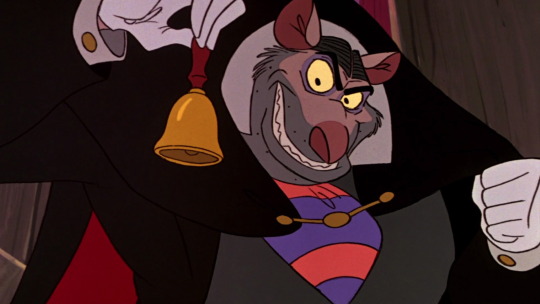
If you know me very well, this choice and its ranking will not be even a remote surprise. If you don’t me as well…it probably still won’t be a remote surprise. Partially due to the fact it’s a Disney film, and partially due to the time when this film was released (it’s one of the more recent entries on the list), AND partially due to its family film status, this is quite likely the introduction most people my age had to Vincent Price, and it’s very likely how most people younger than me will often be introduced to the long-departed actor’s work in times to come.
“The Great Mouse Detective” is also, I would imagine, how many young people end up being introduced to Sherlock Holmes. Because, in essence, that is what this movie is: it’s Sherlock Holmes, but with rodents in the roles. The story focuses on the madcap genius detective, Basil of Baker Street (voiced by Barrie Ingham), on his first case with his future partner, Dr. Dawson. The two have to work together to save a young mouse girl and her father, when they are kidnapped by Basil’s nemesis: the unhinged criminal mastermind, Professor Ratigan, Price’s role in the story. Ratigan plans to use the father’s special skills to help him assassinate the Queen of Mousedom, and then – you guessed it – take over the kingdom. It’s a race against time to stop Ratigan’s evil plan, save the victims, and spare the Queen and the kingdom alike from a hideous fate.
This role came fairly late in Vincent’s career, and perhaps that’s what made it so special to him. He said more than once, in his waning years, that Ratigan had become his all-time favorite part…and considering all the incredible movies and characters he played before this slimy, contemptible sewer rat, that’s got to be saying a lot! Price described Ratigan as someone “playing the Great Villain, while also BEING the Great Villain.” There’s a sort of self-awareness to Ratigan and his melodramatic evil that I think makes him so fun to watch: he just so utterly ENJOYS all of his own wicked ways, and seems to self-consciously do things with the intent of making them as nasty and as grand as he possibly can. Intriguingly, there’s a hint of empathy to Ratigan, however: it’s hinted that the reason he’s become so evil is because he’s been prejudiced by society, since rats are seen as scummy, dirty, verminous things. He dresses himself in the finest clothes and puts on foppish manners in an attempt to seem more debonair and sophisticated…but ironically, his twisted nature only furthers the very stereotype he despises.
Vincent’s voicework is a huge part of what makes Ratigan so wonderful. You can tell the man was having an absolute ball with every SYLLABLE he utters, and the animation and his voice blend together so seamlessly it’s impossible to imagine him in the booth whenever you watch the character. That’s something that’s difficult for even the very best celebrity voice artists, but the combination of Vincent’s dedicated performance and the artful animation makes it work brilliantly. His Ratigan is the Joker of Disney: a character who can flip on a dime from humorously evil and infectiously gleeful in his villainy…to a genuinely menacing, threatening, and thoroughly despicable character. He’s one of the finest portrayals of the character of Professor Moriarty ever put to the screen; I’m honestly surprised Vincent never played the character in live-action, especially considering both Peter Cushing and Christopher Lee played Holmes himself at different points in their own careers. Maybe somewhere in that big movie studio in the sky, the three of them are putting on the greatest Sherlock Holmes film ever made.
Here's hoping a lot of us down here get to see it someday.
One last thing: a funny story about Price in this movie. Apparently, when Price found out about the film, he outright called up the management and Disney and asked if he could take part in it. They responded by saying he would have to audition. “If anyone but Disney had asked me to do that,” Vincent said, “I would have been insulted!”
Tomorrow, the countdown concludes with my Number One! Who will it be? What will it be? Stay tuned to find out!
#list#countdown#best#favorites#top 31 vincent price performances#the price may be right#number 2#vincent price#actors#acting#animation#voice acting#film#movies#sherlock holmes#professor moriarty#professor ratigan#basil of baker street#disney#the great mouse detective
31 notes
·
View notes
Text

I posted 3,447 times in 2021
123 posts created (4%)
3324 posts reblogged (96%)
For every post I created, I reblogged 27.0 posts.
I added 1,063 tags in 2021
#0 - 23 posts
#the terror - 396 posts
#jared harris - 186 posts
#francis crozier - 145 posts
#james fitzjames - 99 posts
#thomas jopson - 77 posts
#the terror amc - 53 posts
#tobias menzies - 31 posts
#fitzier - 29 posts
#texts from last night - 24 posts
Longest Tag: 140 characters
#& then when u read the battersby biography it gets even better cuz you realize he was fitzy's dumbass sidekick from the birdshit island days
My Top Posts in 2021
#5
Latest in our Jared Harris watch was Sherlock Holmes: A Game of Shadows. I had only seen once before, in the theater with my dad. I immediately thought Jared was super hot but disconnected my brain because I didn’t want to think about his hotness next to my dad. Jared is my absolute favorite portrayal of Moriarty. The quiet intensity, the Irish lilt in his voice, watching him lecture about math, watching him get off on torturing Holmes. And then there is Moran and I am convinced that those two were in a relationship. I have deeply mixed feelings about the film overall thanks to the racism and the queer baiting but Jared’s performance is a tour de force. It’s the only version where I almost want Moriarty to win. Also Jared Harris looks amazing in every fucking outfit. The tweed suit and academic gown? Stunning! The suit with white tie and gloves? Wreck me, sir! And the man can absolutely rock a top hat. I am glad I was reintroduced to Jared’s performance and that some exquisite BDSM Moriarty/Moran fanfic exists.
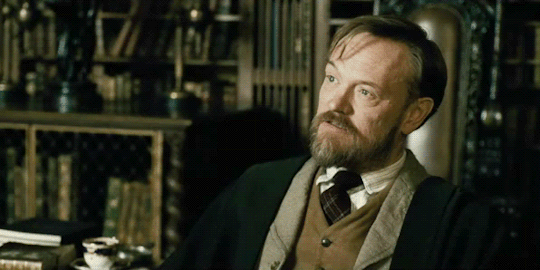

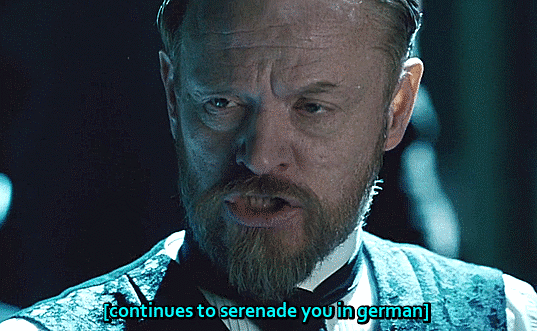
23 notes • Posted 2021-06-25 03:18:52 GMT
#4
I also bought this Jared Harris wardrobe swatch. By the feel of the material, it came from a shirt. My inner Jopson damn near fainted. I have been petting it slightly obsessively.

24 notes • Posted 2021-09-07 23:12:24 GMT
#3
We had to watch the last few episodes of The Terror last night. Holy hell, what a powerhouse of a show, though I spent a great deal of time hiding in my wife’s boobs. More notes
1. Jared Harris continues to be amazing
2. I wish Adam Nagaitis had more scenes in Chernobyl because the man is super talented. On a related note, my wife and I are now working on a Cornelius All Along song
3. The love between Jared Harris and his valet is real and so heartwarming
4. I am very impressed with the way this show depicts male bonds and masculinity
5. So many characters I did not know I would cry for
6. The final episode almost broke me
What a roller coaster of a journey. Thanks to all the Jared Harris fans out there who pointed us in the right direction
29 notes • Posted 2021-03-28 14:47:14 GMT
#2
Hello Terrors! I’m getting really excited for Terror Camp but I have more exciting news! My panel “There Will Be Poems”: Depictions of Masculinity and Care in Modern Media has been accepted for the Northeast Modern Language Association conference in 2022! My work will involve discussion of true and false care and lots of tender Francis. I will be presenting my Terror research and I hope to get some feedback after Terror Camp. Hopefully in 2022 I can try to publish my work. It would make to so happy to discuss this amazing show and performances in a journal. I would like to thank everyone here who encouraged down. I’ve been down since my PhD graduation and it feels good to get back into academic stuff.
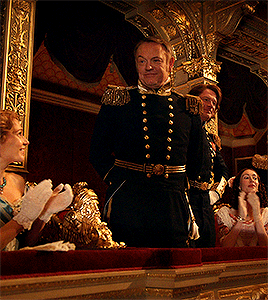
50 notes • Posted 2021-07-02 23:29:32 GMT
#1
So I just came across Jared Harris in The Other Boleyn Girl. My God. The beauty of that man is beyond compare. I have never seen a man moan like that in sex scenes and I need a very cold shower. Also seeing what that gorgeous ass looks like naked and being able to gaze upon the freckles was entirely too much. I would not have been able to handle this as a teen and I’m still shook as a 33 year old. Also really enjoyed the confessional style filming and the costumes weren’t so shiny as the Hollywood version. But Jared Harris had me swooning. I’m only sorry that there hardly any pictures of him from this masterpiece, presumably because he would break the internet.
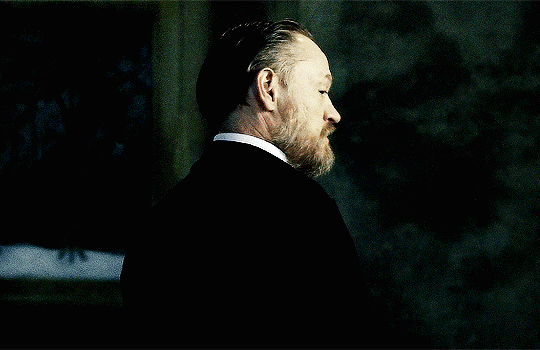

62 notes • Posted 2021-06-04 05:26:37 GMT
Get your Tumblr 2021 Year in Review →
8 notes
·
View notes
Photo
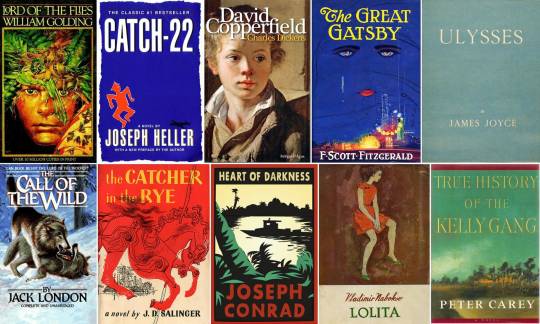
The 100 best novels written in English: the full list
After two years of careful consideration, Robert McCrum has reached a verdict on his selection of the 100 greatest novels written in English. Take a look at his list.
1. The Pilgrim’s Progress by John Bunyan (1678)
A story of a man in search of truth told with the simple clarity and beauty of Bunyan’s prose make this the ultimate English classic.
2. Robinson Crusoe by Daniel Defoe (1719)
By the end of the 19th century, no book in English literary history had enjoyed more editions, spin-offs and translations. Crusoe’s world-famous novel is a complex literary confection, and it’s irresistible.
3. Gulliver’s Travels by Jonathan Swift (1726)
A satirical masterpiece that’s never been out of print, Jonathan Swift’s Gulliver’s Travels comes third in our list of the best novels written in English
4. Clarissa by Samuel Richardson (1748)
Clarissa is a tragic heroine, pressured by her unscrupulous nouveau-riche family to marry a wealthy man she detests, in the book that Samuel Johnson described as “the first book in the world for the knowledge it displays of the human heart.”
5. Tom Jones by Henry Fielding (1749)
Tom Jones is a classic English novel that captures the spirit of its age and whose famous characters have come to represent Augustan society in all its loquacious, turbulent, comic variety.
6. The Life and Opinions of Tristram Shandy, Gentleman by Laurence Sterne (1759)
Laurence Sterne’s vivid novel caused delight and consternation when it first appeared and has lost little of its original bite.
7. Emma by Jane Austen (1816)
Jane Austen’s Emma is her masterpiece, mixing the sparkle of her early books with a deep sensibility.
8. Frankenstein by Mary Shelley (1818)
Mary Shelley’s first novel has been hailed as a masterpiece of horror and the macabre.
9. Nightmare Abbey by Thomas Love Peacock (1818)
The great pleasure of Nightmare Abbey, which was inspired by Thomas Love Peacock’s friendship with Shelley, lies in the delight the author takes in poking fun at the romantic movement.
10. The Narrative of Arthur Gordon Pym of Nantucket by Edgar Allan Poe (1838)
Edgar Allan Poe’s only novel – a classic adventure story with supernatural elements – has fascinated and influenced generations of writers.
11. Sybil by Benjamin Disraeli (1845)
The future prime minister displayed flashes of brilliance that equalled the greatest Victorian novelists.
12. Jane Eyre by Charlotte Brontë (1847)
Charlotte Brontë’s erotic, gothic masterpiece became the sensation of Victorian England. Its great breakthrough was its intimate dialogue with the reader.
13. Wuthering Heights by Emily Brontë (1847)
Emily Brontë’s windswept masterpiece is notable not just for its wild beauty but for its daring reinvention of the novel form itself.
14. Vanity Fair by William Thackeray (1848)
William Thackeray’s masterpiece, set in Regency England, is a bravura performance by a writer at the top of his game.
15. David Copperfield by Charles Dickens (1850)
David Copperfield marked the point at which Dickens became the great entertainer and also laid the foundations for his later, darker masterpieces.
16. The Scarlet Letter by Nathaniel Hawthorne (1850)
Nathaniel Hawthorne’s astounding book is full of intense symbolism and as haunting as anything by Edgar Allan Poe.
17. Moby-Dick by Herman Melville (1851)
Wise, funny and gripping, Melville’s epic work continues to cast a long shadow over American literature.
18. Alice’s Adventures in Wonderland by Lewis Carroll (1865)
Lewis Carroll’s brilliant nonsense tale is one of the most influential and best loved in the English canon.
19. The Moonstone by Wilkie Collins (1868)
Wilkie Collins’s masterpiece, hailed by many as the greatest English detective novel, is a brilliant marriage of the sensational and the realistic.
20. Little Women by Louisa May Alcott (1868-9)
Louisa May Alcott’s highly original tale aimed at a young female market has iconic status in America and never been out of print.
21. Middlemarch by George Eliot (1871-2)
This cathedral of words stands today as perhaps the greatest of the great Victorian fictions.
22. The Way We Live Now by Anthony Trollope (1875)
Inspired by the author’s fury at the corrupt state of England, and dismissed by critics at the time, The Way We Live Now is recognised as Trollope’s masterpiece.
23. The Adventures of Huckleberry Finn by Mark Twain (1884/5)
Mark Twain’s tale of a rebel boy and a runaway slave seeking liberation upon the waters of the Mississippi remains a defining classic of American literature.
24. Kidnapped by Robert Louis Stevenson (1886)
A thrilling adventure story, gripping history and fascinating study of the Scottish character, Kidnapped has lost none of its power.
25. Three Men in a Boat by Jerome K Jerome (1889)
Jerome K Jerome’s accidental classic about messing about on the Thames remains a comic gem.
26. The Sign of Four by Arthur Conan Doyle (1890)
Sherlock Holmes’s second outing sees Conan Doyle’s brilliant sleuth – and his bluff sidekick Watson – come into their own.
27. The Picture of Dorian Gray by Oscar Wilde (1891)
Wilde’s brilliantly allusive moral tale of youth, beauty and corruption was greeted with howls of protest on publication.
28. New Grub Street by George Gissing (1891)
George Gissing’s portrayal of the hard facts of a literary life remains as relevant today as it was in the late 19th century.
29. Jude the Obscure by Thomas Hardy (1895)
Hardy exposed his deepest feelings in this bleak, angry novel and, stung by the hostile response, he never wrote another.
30. The Red Badge of Courage by Stephen Crane (1895)
Stephen Crane’s account of a young man’s passage to manhood through soldiery is a blueprint for the great American war novel.
31. Dracula by Bram Stoker (1897)
Bram Stoker’s classic vampire story was very much of its time but still resonates more than a century later.
32. Heart of Darkness by Joseph Conrad (1899)
Joseph Conrad’s masterpiece about a life-changing journey in search of Mr Kurtz has the simplicity of great myth.
33. Sister Carrie by Theodore Dreiser (1900)
Theodore Dreiser was no stylist, but there’s a terrific momentum to his unflinching novel about a country girl’s American dream.
34. Kim by Rudyard Kipling (1901)
In Kipling’s classic boy’s own spy story, an orphan in British India must make a choice between east and west.
35. The Call of the Wild by Jack London (1903)
Jack London’s vivid adventures of a pet dog that goes back to nature reveal an extraordinary style and consummate storytelling.
36. The Golden Bowl by Henry James (1904)
American literature contains nothing else quite like Henry James’s amazing, labyrinthine and claustrophobic novel.
37. Hadrian the Seventh by Frederick Rolfe (1904)
This entertaining if contrived story of a hack writer and priest who becomes pope sheds vivid light on its eccentric author – described by DH Lawrence as a “man-demon”.
38. The Wind in the Willows by Kenneth Grahame (1908)
The evergreen tale from the riverbank and a powerful contribution to the mythology of Edwardian England.
39. The History of Mr Polly by HG Wells (1910)
The choice is great, but Wells’s ironic portrait of a man very like himself is the novel that stands out.
40. Zuleika Dobson by Max Beerbohm (1911)
The passage of time has conferred a dark power upon Beerbohm’s ostensibly light and witty Edwardian satire.
41. The Good Soldier by Ford Madox Ford (1915)
Ford’s masterpiece is a searing study of moral dissolution behind the facade of an English gentleman – and its stylistic influence lingers to this day.
42. The Thirty-Nine Steps by John Buchan (1915)
John Buchan’s espionage thriller, with its sparse, contemporary prose, is hard to put down.
43. The Rainbow by DH Lawrence (1915)
The Rainbow is perhaps DH Lawrence’s finest work, showing him for the radical, protean, thoroughly modern writer he was.
44. Of Human Bondage by W Somerset Maugham (1915)
Somerset Maugham’s semi-autobiographical novel shows the author’s savage honesty and gift for storytelling at their best.
45. The Age of Innocence by Edith Wharton (1920)
The story of a blighted New York marriage stands as a fierce indictment of a society estranged from culture.
46. Ulysses by James Joyce (1922)
This portrait of a day in the lives of three Dubliners remains a towering work, in its word play surpassing even Shakespeare.
47. Babbitt by Sinclair Lewis (1922)
What it lacks in structure and guile, this enthralling take on 20s America makes up for in vivid satire and characterisation.
48. A Passage to India by EM Forster (1924)
EM Forster’s most successful work is eerily prescient on the subject of empire.
49. Gentlemen Prefer Blondes by Anita Loos (1925)
A guilty pleasure it may be, but it is impossible to overlook the enduring influence of a tale that helped to define the jazz age.
50. Mrs Dalloway by Virginia Woolf (1925)
Woolf’s great novel makes a day of party preparations the canvas for themes of lost love, life choices and mental illness.
51. The Great Gatsby by F Scott Fitzgerald (1925)
Fitzgerald’s jazz age masterpiece has become a tantalising metaphor for the eternal mystery of art.
52. Lolly Willowes by Sylvia Townsend Warner (1926)
A young woman escapes convention by becoming a witch in this original satire about England after the first world war.
53. The Sun Also Rises by Ernest Hemingway (1926)
Hemingway’s first and best novel makes an escape to 1920s Spain to explore courage, cowardice and manly authenticity.
54. The Maltese Falcon by Dashiell Hammett (1929)
Dashiell Hammett’s crime thriller and its hard-boiled hero Sam Spade influenced everyone from Chandler to Le Carré.
55. As I Lay Dying by William Faulkner (1930)
The influence of William Faulkner’s immersive tale of raw Mississippi rural life can be felt to this day.
56. Brave New World by Aldous Huxley (1932)
Aldous Huxley’s vision of a future human race controlled by global capitalism is every bit as prescient as Orwell’s more famous dystopia.
57. Cold Comfort Farm by Stella Gibbons (1932)
The book for which Gibbons is best remembered was a satire of late-Victorian pastoral fiction but went on to influence many subsequent generations.
58. Nineteen Nineteen by John Dos Passos (1932)
The middle volume of John Dos Passos’s USA trilogy is revolutionary in its intent, techniques and lasting impact.
59. Tropic of Cancer by Henry Miller (1934)
The US novelist’s debut revelled in a Paris underworld of seedy sex and changed the course of the novel – though not without a fight with the censors.
60. Scoop by Evelyn Waugh (1938)
Evelyn Waugh’s Fleet Street satire remains sharp, pertinent and memorable.
61. Murphy by Samuel Beckett (1938)
Samuel Beckett’s first published novel is an absurdist masterpiece, a showcase for his uniquely comic voice.
62. The Big Sleep by Raymond Chandler (1939)
Raymond Chandler’s hardboiled debut brings to life the seedy LA underworld – and Philip Marlowe, the archetypal fictional detective.
63. Party Going by Henry Green (1939)
Set on the eve of war, this neglected modernist masterpiece centres on a group of bright young revellers delayed by fog.
64. At Swim-Two-Birds by Flann O’Brien (1939)
Labyrinthine and multilayered, Flann O’Brien’s humorous debut is both a reflection on, and an exemplar of, the Irish novel.
65. The Grapes of Wrath by John Steinbeck (1939)
One of the greatest of great American novels, this study of a family torn apart by poverty and desperation in the Great Depression shocked US society.
66. Joy in the Morning by PG Wodehouse (1946)
PG Wodehouse’s elegiac Jeeves novel, written during his disastrous years in wartime Germany, remains his masterpiece.
67. All the King’s Men by Robert Penn Warren (1946)
A compelling story of personal and political corruption, set in the 1930s in the American south.
68. Under the Volcano by Malcolm Lowry (1947)
Malcolm Lowry’s masterpiece about the last hours of an alcoholic ex-diplomat in Mexico is set to the drumbeat of coming conflict.
69. The Heat of the Day by Elizabeth Bowen (1948)
Elizabeth Bowen’s 1948 novel perfectly captures the atmosphere of London during the blitz while providing brilliant insights into the human heart.
70. Nineteen Eighty-Four by George Orwell (1949)
George Orwell’s dystopian classic cost its author dear but is arguably the best-known novel in English of the 20th century.
71. The End of the Affair by Graham Greene (1951)
Graham Greene’s moving tale of adultery and its aftermath ties together several vital strands in his work.
72. The Catcher in the Rye by JD Salinger (1951)
JD Salinger’s study of teenage rebellion remains one of the most controversial and best-loved American novels of the 20th century.
73. The Adventures of Augie March by Saul Bellow (1953)
In the long-running hunt to identify the great American novel, Saul Bellow’s picaresque third book frequently hits the mark.
74. Lord of the Flies by William Golding (1954)
Dismissed at first as “rubbish & dull”, Golding’s brilliantly observed dystopian desert island tale has since become a classic.
75. Lolita by Vladimir Nabokov (1955)
Nabokov’s tragicomic tour de force crosses the boundaries of good taste with glee.
76. On the Road by Jack Kerouac (1957)
The creative history of Kerouac’s beat-generation classic, fuelled by pea soup and benzedrine, has become as famous as the novel itself.
77. Voss by Patrick White (1957)
A love story set against the disappearance of an explorer in the outback, Voss paved the way for a generation of Australian writers to shrug off the colonial past.
78. To Kill a Mockingbird by Harper Lee (1960)
Her second novel finally arrived this summer, but Harper Lee’s first did enough alone to secure her lasting fame, and remains a truly popular classic.
79. The Prime of Miss Jean Brodie by Muriel Spark (1960)
Short and bittersweet, Muriel Spark’s tale of the downfall of a Scottish schoolmistress is a masterpiece of narrative fiction.
80. Catch-22 by Joseph Heller (1961)
This acerbic anti-war novel was slow to fire the public imagination, but is rightly regarded as a groundbreaking critique of military madness.
81. The Golden Notebook by Doris Lessing (1962)
Hailed as one of the key texts of the women’s movement of the 1960s, this study of a divorced single mother’s search for personal and political identity remains a defiant, ambitious tour de force.
82. A Clockwork Orange by Anthony Burgess (1962)
Anthony Burgess’s dystopian classic still continues to startle and provoke, refusing to be outshone by Stanley Kubrick’s brilliant film adaptation.
83. A Single Man by Christopher Isherwood (1964)
Christopher Isherwood’s story of a gay Englishman struggling with bereavement in LA is a work of compressed brilliance.
84. In Cold Blood by Truman Capote (1966)
Truman Capote’s non-fiction novel, a true story of bloody murder in rural Kansas, opens a window on the dark underbelly of postwar America.
85. The Bell Jar by Sylvia Plath (1966)
Sylvia Plath’s painfully graphic roman à clef, in which a woman struggles with her identity in the face of social pressure, is a key text of Anglo-American feminism.
86. Portnoy’s Complaint by Philip Roth (1969)
This wickedly funny novel about a young Jewish American’s obsession with masturbation caused outrage on publication, but remains his most dazzling work.
87. Mrs Palfrey at the Claremont by Elizabeth Taylor (1971)
Elizabeth Taylor’s exquisitely drawn character study of eccentricity in old age is a sharp and witty portrait of genteel postwar English life facing the changes taking shape in the 60s.
88. Rabbit Redux by John Updike (1971)
Harry “Rabbit” Angstrom, Updike’s lovably mediocre alter ego, is one of America’s great literary protoganists, up there with Huck Finn and Jay Gatsby.
89. Song of Solomon by Toni Morrison (1977)
The novel with which the Nobel prize-winning author established her name is a kaleidoscopic evocation of the African-American experience in the 20th century.
90. A Bend in the River by VS Naipaul (1979)
VS Naipaul’s hellish vision of an African nation’s path to independence saw him accused of racism, but remains his masterpiece.
91. Midnight’s Children by Salman Rushdie (1981)
The personal and the historical merge in Salman Rushdie’s dazzling, game-changing Indian English novel of a young man born at the very moment of Indian independence.
92. Housekeeping by Marilynne Robinson (1981)
Marilynne Robinson’s tale of orphaned sisters and their oddball aunt in a remote Idaho town is admired by everyone from Barack Obama to Bret Easton Ellis.
93. Money: A Suicide Note by Martin Amis (1984)
Martin Amis’s era-defining ode to excess unleashed one of literature’s greatest modern monsters in self-destructive antihero John Self.
94. An Artist of the Floating World by Kazuo Ishiguro (1986)
Kazuo Ishiguro’s novel about a retired artist in postwar Japan, reflecting on his career during the country’s dark years, is a tour de force of unreliable narration.
95. The Beginning of Spring by Penelope Fitzgerald (1988)
Fitzgerald’s story, set in Russia just before the Bolshevik revolution, is her masterpiece: a brilliant miniature whose peculiar magic almost defies analysis.
96. Breathing Lessons by Anne Tyler (1988)
Anne Tyler’s portrayal of a middle-aged, mid-American marriage displays her narrative clarity, comic timing and ear for American speech to perfection.
97. Amongst Women by John McGahern (1990)
This modern Irish masterpiece is both a study of the faultlines of Irish patriarchy and an elegy for a lost world.
98. Underworld by Don DeLillo (1997)
A writer of “frightening perception”, Don DeLillo guides the reader in an epic journey through America’s history and popular culture.
99. Disgrace by JM Coetzee (1999)
In his Booker-winning masterpiece, Coetzee’s intensely human vision infuses a fictional world that both invites and confounds political interpretation.
100. True History of the Kelly Gang by Peter Carey (2000)
Peter Carey rounds off our list of literary milestones with a Booker prize-winning tour-de-force examining the life and times of Australia’s infamous antihero, Ned Kelly.
Daily inspiration. Discover more photos at http://justforbooks.tumblr.com
69 notes
·
View notes
Text
The Devils I Know - Number 29
Welcome to “The Devils I Know!” For this spooky time of year, from now till Halloween, I’ll be counting down My Top 31 Depictions of the Devil, from movies, television, video games, and more! Today’s Devil loves an island adventure.
Number 29 is…Roddy McDowall, from Fantasy Island.
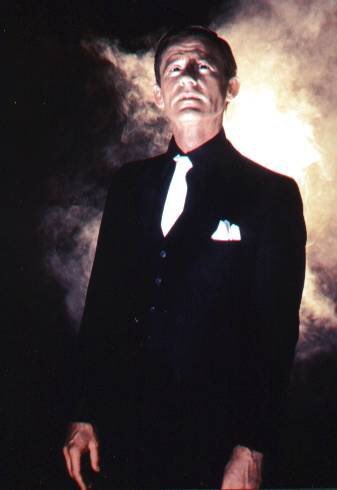
In my previous pick, I talked about Julie Newmar’s portrayal of the Devil from the Twilight Zone; I also mentioned Burgess Meredith, who played the character in a totally different episode of the same series. Neither Newmar nor Meredith were the only Batman Villain alumni to play the Devil, however. Enter Roddy McDowall: the Bookworm from the 1960s series, and the Mad Hatter from the Animated Series, among countless other roles. McDowall is one of my favorite actors, and it’s kind of amazing it took me a while to discover his Devil: until sometime about a year ago, I’d never known about him.
McDowall played the Devil – here referred to as Mephistopheles – in the classic TV series “Fantasy Island.” The show focused on a magical island where different tourists could wish for their hearts desires, and those desires would then become reality during their stay. Sometimes these fantasies turned out to be pleasant, sometimes they ended up bittersweet or downright depressing, and sometimes they were utterly horrifying. It all depended on the person and the wish. McDowall first appeared in the show as a mere guest, but he would later return in a much larger part as Mephistopheles, popping up in two separate episodes: “The Devil and Mandy Breem,” and “The Devil and Mr. Roarke,” from seasons four and five, respectively. Ever since discovering him, he has become one of my favorites of McDowall’s characters and performances.
Both episodes effectively have the same setup: Mephistopheles comes to Fantasy Island seeking the soul of at least one of the guests touring the place at that time. He makes a bet with Mr. Roarke, the caretaker of the island (played by Khan himself, Ricardo Montalban) to try and claim those souls, as well as Roarke’s. In the end, however, the decisions of the guests and the caretaker’s own sharp wits allow them to defeat Mephistopheles, and the Devil is sent packing without a soul to his name.
Although he only appeared twice, and both episodes were somewhat similar in nature, McDowall’s Mephistopheles nevertheless became a memorable character. He was essentially treated as Roarke’s nemesis: it was clear the two knew each other from long ago, and their relationship was very much that of a Sherlock Holmes and Professor Moriarty duo: they seemed to respect each other as much as they despised each other. It was never really clear how or why this was, which only made both characters more intriguing. The parallels between the two were certainly worth noting: both Roarke and Mephistopheles gave people a chance for their hearts’ desires to be made manifest. And in both cases, what those people got wasn’t always what they bargained for. Ultimately, however, Roarke never intends to do harm with his work, and shows more humanity and understanding; Mephistopheles is purely and simply evil, relishing the sight of other suffering from his machinations. A great example of the hero and the villain reflecting one another.
Tomorrow, the countdown continues with Number 28!
HINT: What happens when two Princes of Darkness meet?
#top 31 devils#the devils i know#fiction#halloween advent calendar#october special#number 29#tv#fantasy island#roddy mcdowall#mephistopheles#best#favorites#list#countdown
17 notes
·
View notes
Text
Christopher Lee: A Sinister Centenary - Number 11
Welcome to Christopher Lee: A Sinister Centenary! Over the course of May, I will be counting down My Top 31 Favorite Performances by my favorite actor, the late, great Sir Christopher Lee, in honor of his 100th Birthday. Although this fine actor left us a few years ago, his legacy endures, and this countdown is a tribute to said legacy!
Today’s Subject, My 11th Favorite Christopher Lee Performance: Mycroft Holmes, from The Private Life of Sherlock Holmes.
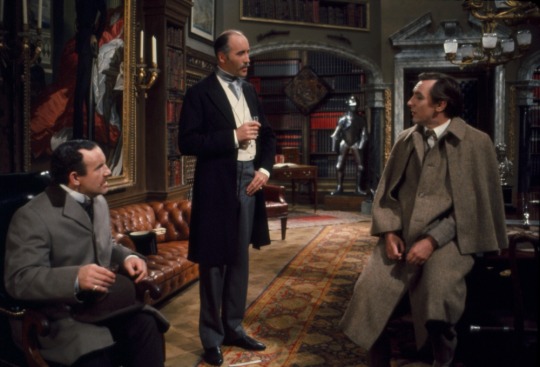
Question: who here likes “Sherlock” or “Moriarty the Patriot”? Or both, for that matter? If you do…(points to the above picture)…this actor. This role. This movie. You have them to thank for the gloriousness of Mycroft Holmes in both those incarnations, as well as a few more. I mentioned Lee’s role as Mycroft in an earlier choice on the countdown, and I also briefly spoke of him a year ago in my “Ele-May-ntary” countdown, where I discussed various takes on Sherlock Holmes. Now, it’s time to give him the limelight.
“The Private Life of Sherlock Holmes” was a sort of “dramedy” created by Billy Wilder. The film took a more humorous but also more personal and unique look into the character of Sherlock Holmes, purposefully playing with layers to some of the major players of the stories that had not been toyed with before. Chief among them was Christopher Lee in the role of Mycroft. In the original books, Mycroft only appears twice, and is mentioned a handful of other times. Up until Lee took on the role in this 1970 release, the character was not exactly a household name. It was Lee who, in many ways, created the Mycroft we know today in more modern incarnations, and allowed the character to become much more prominent in future Sherlock Holmes outings.
Mycroft is actually only present in the film for a few scenes, but these scenes are fairly lengthy and the character is highly involved in the plot of the picture. What is most influential about Lee’s Mycroft, however, is his personality and overall portrayal: in the books, Mycroft is largely a comical figure. His now famous role of essentially “BEING the British Government” – head of its military intelligence, second only to the Queen and the Prime Minister on the power level, aware of seemingly everything going on in the country and how its run – is really just a backdrop. He is not a buffoon, but he is clownish in a sort of pompous, blustering way; a loveable figure.
This is not the case in “Private Life”: Mycroft here is depicted as having a strong sibling rivalry with Sherlock, and is given a much more steely personality. While not totally unlikeable, as he does care about his brother, and is ultimately just trying to do what he thinks is best, he is an authoritarian figure full of secrets, whom not even the Master Detective – his own flesh and blood – can fully trust at all times. His role in the government is greatly expanded upon, and becomes a focal point for his character. He still has funny moments, given that this movie is largely comedic in tone, but he’s no longer a jovial caricature. He is whiplike, dangerous, but has his soft edges. This is really the Mycroft so many have come to love, portrayed by people like Mark Gatiss and J. Michael Tatum: a figure of power, not fun and games. And even for portrayals that veer more towards the comic, such as Stephen Fry or Charles Gray, the size of the character’s role in those versions, and the emphasis on his power in politics and economy, is undeniably influenced by Lee’s turn in the part.
For Lee himself, this role was a breath of fresh air. Lee would forever go on to state that Wilder was one of his favorite directors he ever worked with, partially because the man gave him a chance he hadn’t gotten from so many others. Keep in mind, in 1970, Lee appeared in no less than four Dracula movies all in the span of the same year, and he was also balancing Fu Manchu and many other past and present horror movie roles at the same time. Wilder told Lee he didn’t care about any of that, and the actor saw this as another opportunity to show his range and work on something a little different. For fans of Sherlock Holmes ever since then, I think we’re all glad this chance came about.
We’re moving into the Top 10, everyone! The end draws ever nearer…tomorrow, I present my choice for Number 10!
#sinister centenary#christopher lee#top 31 christopher lee performances#happy birthday christopher lee#best#favorites#list#countdown#may special#number 11#mycroft#mycroft holmes#the private life of sherlock holmes#sherlock holmes
12 notes
·
View notes
Text
Christopher Lee: A Sinister Centenary - Number 27
Welcome to Christopher Lee: A Sinister Centenary! Over the course of May, I will be counting down My Top 31 Favorite Performances by my favorite actor, the late, great Sir Christopher Lee, in honor of his 100th Birthday. Although this fine actor left us a few years ago, his legacy endures, and this countdown is a tribute to said legacy!
Today’s Subject, My 27th Favorite Christopher Lee Performance: Fu Manchu, from the 1960s “Fu Manchu” Film Series.
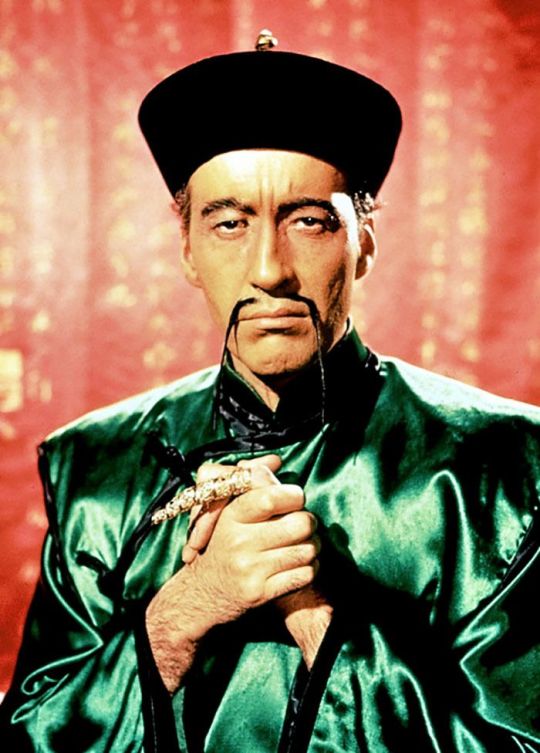
Oh, dear…this one’s gonna be awkward…
Okay, so…I think the reasons this one ranks so low are obvious, but let’s focus on the history first. For those who do not know, Fu Manchu was a pulp fiction character and the titular main antagonist of a series of crime thriller stories by author Sax Rohmer. The stories focused on the neverending rivalry between the so-called Devil Doctor and his arch-nemesis, a Scotland Yard detective called Sir Nayland Smith. The character of Fu Manchu is widely regarded as one of the first supervillains ever created; he is, if nothing else, one of the grandfathers of the supervillain, generally lumped in alongside Professor Moriarty from Sherlock Holmes as one of the forerunners to the basic type.
Fu Manchu has appeared onscreen a great (and an unfortunate) number of times, being played in the past by such actors as Boris Karloff, Henry Brandon, and Charlie Chan himself, Warner Oland. In the 1970s, a resurgence in popularity with the character led to a whole series of films, produced and frequently written by Harry Alan Towers, and starring Christopher Lee as the titular villain. Many regard Lee’s Fu Manchu as the best portrayal of the character onscreen, largely due to the number of features he appeared in…though how much that’s really saying is up to debate…
…Sigh…I…guess I can’t ignore the elephant in the room for too long, can I? Very well, let’s get this out of the way: Fu Manchu is NOTORIOUSLY racist as a character. You almost never see him nowadays, and it’s for good reason: Fu Manchu has been one of the most negative influences on Asian culture in America and other Western countries ever created. To be fair – and yes, I’m going to be fair – that was actually kind of the point of the character: the villain was described as “The Yellow Peril Incarnate.” In other words, he’s intended to be the worst nightmare anyone could imagine from that area of fear, and the writer, Sax Rohmer, was well-aware of it when writing.
One also has to give Fu Manchu props, he’s not actually a one-dimensional character: his motivations for his villainy, in the original stories and most adaptations – including Lee’s work – are not as cut and dry as “evil guy from China wants to take over the world.” His reasons are complex, and so is his character: Fu Manchu, in most versions, has a twisted sense of honor and dignity, following a particularly warped but still very much present moral code. He’s also devoted to his family, genuinely loving and caring for his loyal daughter, Fah Lo Suee, and can even be kind and generous under the right circumstances. However…yeah…one look at the character’s visual design alone tells you all you need to know. There’s no avoiding the fact that the character (and the treatment of Asian culture, in general, in the books and most of his appearances in film) is unforgivably prejudiced.
HAVING SAID ALL THAT…it’s telling that Fu Manchu is still one of Lee’s most iconic characters, and for all the awkwardness that comes with him, he’s still a fine villain in his own right. Sophisticated, cold, but with flashes of humor and even occasional grains of sympathy sprinkled throughout his appearances, the seemingly immortal Devil Doctor – using a mixture of arcane magic and cutting-edge science to do battle with his nemeses – wasn’t a character entirely without merit. He was an interesting antagonist, and you can tell Lee tried his hardest to bring more to the character than what others might perceive, making him one of the most threatening and unironically interesting takes on the character put to film. The sad fact is simply that, for all the merits one can find in Lee’s Fu Manchu…he IS still Fu Manchu, and that’s sadly a character name that will always carry a tragic stigma with it. As a result, while I enjoy Lee’s performances and treatment of the role, I don’t think I can rate him too highly in good conscience.
Don’t worry, future entries on this list will be far, FAR less sweat-inducing to discuss.
Tomorrow the countdown continues with My Number 26 choice!
#sinister centenary#christopher lee#happy birthday christopher lee#top 31 christopher lee performances#countdown#list#number 27#may special#fu manchu#films#movies#actor#acting#awkwardness abounds
14 notes
·
View notes
Text
Ele-May-ntary - NUMBER ONE
Welcome – for the last time – to Ele-May-ntary! All throughout the month of May, I’ve been counting down my Top 31 Favorite Portrayals of Sherlock Holmes. I’ve talked about different versions from movies, television, radio, and even video games! And now, the time has come to unveil my number one choice.
Now, we’ve covered a LOT of takes on Sherlock Holmes, obviously. I’ve talked about versions that are very popular, and I’ve talked about versions that are more obscure. Who could possibly top all of the different versions I’ve discussed? For some people, this may be a no-brainer…but to many others, it might seem surprising.
NUMBER ONE IS…Jeremy Brett.

I recently saw a report from GQ Magazine, of all things, that claimed Jeremy Brett’s Holmes was “vanilla.” I frankly find this statement to be offensive. People are entitled to their own opinions, and I won’t deride anyone for having different favorites from me, but…“vanilla”? That is about as far from Jeremy Brett as you can GET.
Until Benedict Cumberbatch came around, for many people, Jeremy Brett was tied only with Basil Rathbone as perhaps the single most definitive take on Sherlock Holmes. Brett starred as the character in the long-running Granada TV series – initially released under the title of “The Adventures of Sherlock Holmes,” but retitled with every other season to sort of emulate the books. He also played Holmes in a play titled “The Secret of Sherlock Holmes,” in which one of his two Watsons, Edward Hardwicke, also appeared. (Hardwicke, for the record, has played Watson more than any other actor; before him, Brett’s Watson was one David Burke, who I actually personally like a little more, but I digress.) What I love about Jeremy Brett’s Holmes is what I love about nearly every Holmes worth their salt: they capture everything about the character, but they also make it their own.
And by Gadfrey, does Jeremy Brett make it his own. Brett had a long standing career on television and in theater before playing the character of Holmes. He appeared in various Shakespeare productions, tackled the role of D’Artagnan in “The Three Musketeers,” and even played the character of the lovesick Freddy in “My Fair Lady!” (Yep. Sherlock Holmes was in that movie. As if it wasn’t good enough.) Interestingly, not long before getting the role of Holmes in the Granada series, Brett actually played Dr. Watson in a stage adaptation of “The Sign of Four,” entitled “The Crucifer of Blood.” He was a highly versatile actor, and no two performances were ever quite the same.
As Holmes, Brett does something very, very clever. His Holmes has all the qualities you would want Holmes to have, in all of the right places: all of his virtues and all of his flaws. But there’s a different sort of flair Brett has. He doesn’t MOVE like any other Holmes, doesn’t SPEAK like any other Holmes; there’s a very specific and particular way he does things and says things that is entirely his own. His mood swings are extreme, and there are so many little quirks and nuances to what he does it’s hard to keep track of them all. Even when he’s just standing perfectly still, there’s always something going on in his eyes, and when he’s in motion, he’s a whirlwind. His disguises are a bit more transparent physically than some other takes, but the way he actually PERFORMS in those disguises does allow you to believe that others would be fooled. He was just that great an actor.
I really feel that Brett captures the freewheeling thought processes of Holmes in a way that others seldom do; in one episode, he moves around a room methodically, totally silent, picking up hints and clues from all over the place…and when he’s done, addresses the room as if he’s been telling them everything. When Watson says to him, “Holmes, can’t you tell us anything now?” he suddenly realizes he’s been pondering everything to himself the whole while, and then begins to detail his findings and theories to the rest of the characters present. He gets so wrapped up in his hunting and deducing that he forgets everything else. I love seeing Brett’s Holmes work, and I love seeing his relationships with the various other major figures of his canon.
Jeremy Brett is both the definitive Holmes and yet not definitive at all; he is one of a kind, taking everything you know and love about the stories, and translating it into a totally unique, fascinating performance that captures your attention thoroughly, stealing every scene he has. He captures both the darkness and the light perfectly, and gives us a portrait of the super sleuth no one has truly managed to match up to, in my opinion: neither before nor since. It is no surprise that he is My Favorite Portrayal of Sherlock Holmes.
Thank you for joining me for Ele-May-ntary! I have another countdown planned for October. See you all in a few months on that front! ;)
#ele-may-ntary#top 31 sherlock holmes portrayals#sherlock holmes#granada#the adventures of sherlock holmes#the return of sherlock holmes#the casebook of sherlock holmes#the memoirs of sherlock holmes#the secret of sherlock holmes#jeremy brett#number 1#number one
39 notes
·
View notes
Text
Ele-May-ntary - Number 7
Welcome to Ele-May-ntary! All throughout the month of May, I’ve been counting down my Top 31 Favorite Portrayals of Sherlock Holmes from movies, television, radio, and even video games!
Over the course of the past 26 days – 24 for the month, and two for the rules and Honorable Mentions – we’ve covered takes on Holmes from America, the United Kingdom, Canada, and even Japan. Beyond our list, there have been takes on Holmes from Spain, Germany, France, and still other places. Needless to say, Holmes is an internationally appealing character…and today’s choice proves that with great aplomb.
Number 7 is…Vasily Livanov.

Keeping mind what I just said about Holmes being internationally appealing, it’s still often considered, somehow, a little bizarre that one of the greatest takes on Holmes ever done – widely regarded as one of the best portrayals ever put to the screen – came from Soviet Russia. Livanov played the role of the Great Detective in a television movie series (somewhat similar to the structure of Sherlock) entitled “The Adventures of Sherlock Holmes & Dr. Watson.” (Watson, for the record, was played by one Vitaly Solomin, who is equally delightful in his role.) The series did its best to stay true to the source material it was based on, adapting some of the best and most important Holmes stories and characters in an atmospheric and intelligent way. To this day, it’s not only regarded as a brilliant take on the Sherlock Holmes universe, but one of the finest Russian television programs EVER made.
Livanov’s Holmes is an interesting one to try and describe. He is somehow both one of the iciest and one the most amusing takes on Holmes ever made. His moods shift so rapidly, and so unpredictably, it’s not always easy to tell when he’s serious or not. You never know if he’s going to calmly continue a conversation, or suddenly burst out into a fit of laughter, or start snapping loudly, or even jump up and strike someone physically. And once the moment of abrupt expression passes, he’s cool and collected once more. Almost nothing seems to ever faze him, and he gives Holmes a sort of easygoing, casual demeanor. He doesn’t just sit in that armchair, he lounges luxuriously. When encountering Moriarty, he addresses the professor in a professional, businesslike, exceedingly calm and patient manner. Even when gloating over the capture of his enemies, he does so in a way that’s so polite, you can’t tell if he’s patronizing them or not.
Having said this, a key to Livanov’s Holmes is that he’s very funny: he has a sense of wit and humor as sharp as his mind, and he can tell a joke in such a way that you almost can’t tell it IS a joke, which only makes the punchline funnier. There’s also a warmth to him, despite the ice; he’s generally cold and cool around other people, but the mask slips a bit when around certain people he trusts more than others, especially Watson and Mrs. Hudson. One of my favorite moments is in “The Tiger Hunt” (an adaptation of “The Empty House”), when Holmes – after seemingly dying in the previous episode – pops up again and bids both his landlady and his best friend and partner hello again. The moment in most versions has Holmes playing it off as a dramatic show, almost like a prank…but in this version, Holmes seems deeply moved, like he’s trying desperately not to cry…until Watson and Mrs. Hudson faint. Then, the mask slips into place, as Holmes very gently and almost clinically says to the dazed Doctor, “I’m alive, Watson. I’m alive. Now stand up.” An example of his Sherlock’s humor, as well as his mercurial temperament, is in “Hound of the Baskervilles.” When Holmes notices Watson without looking at him, Watson declares he must have eyes in the back of his head. Holmes then very, very seriously claims that he actually has heat receptors on the tips of his ears, and even claims to have written a monograph on the subject. You can imagine Watson’s reaction…until Mrs. Hudson tells Watson that Holmes is just joshing him, at which case, Holmes can’t keep up the façade any longer and nearly falls out of his chair with laughter.
Livanov’s portrayal of Holmes remains influential and acclaimed even to this day. In fact, in 2006, he was awarded the honor of becoming a member of the Order of the British Empire, in commemoration of his portrayal of Sherlock Holmes during the Cold War era. In a time when the boundaries between different countries and economies were in a deadly stalemate, one could easily argue that Livanov’s Holmes showed just how powerful this character truly is, crossing borders only the power of fiction and fantasy can truly overcome.
The countdown continues tomorrow! We’re nearly in the top five! Who will be next? Check in and find out!
#ele-may-ntary#top 31 sherlock holmes portrayals#sherlock holmes#the adventures of sherlock holmes and dr watson#russian tv holmes#vasily livanov#number 7
32 notes
·
View notes
Text
Ele-May-ntary - Number 3
Welcome to Ele-May-ntary! All throughout the month of May, I’ve been counting down my Top 31 Favorite Portrayals of Sherlock Holmes, from movies, television, radio, and video games!
We’ve reached the Top 3! The end draws ever nearer! And for those of you who have been wondering about this particularly well-known portrayal, the wait is over.
Number 3 is…Basil Rathbone.
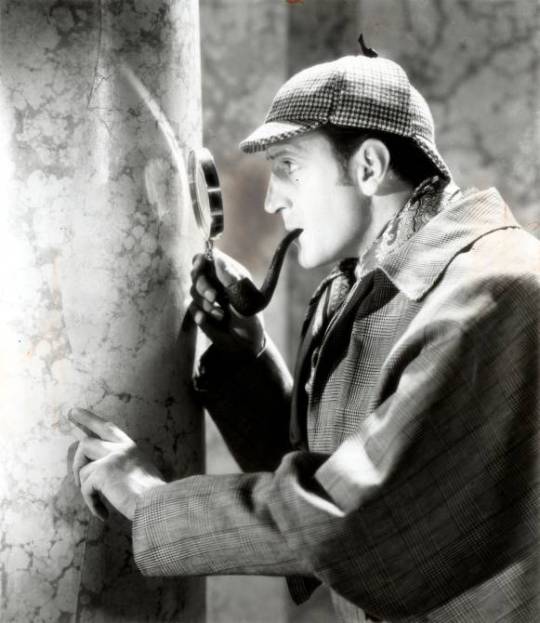
There have been many actors who people would call the definitive Sherlock Holmes. This interpretation may or may not be worthy of that specific title, but I think it’s very fair to say that Basil Rathbone is the most ICONIC Sherlock Holmes. So much of what we identify as Holmes today comes more from Rathbone than any other actor before or since. Even to this day, to tons and tons of people, Rathbone just IS Sherlock Holmes, much in the same way Bela Lugosi is Dracula or Boris Karloff is Frankenstein’s Monster. However accurate or inaccurate to the source material these portrayals may be, they’ve just become so synonymous with both the actor and the literary character that it’s hard to separate them.
Part of Rathbone’s power as Holmes comes from his longevity in the role. He first played Holmes for two films produce by 20th Century FOX. These pictures – “The Hound of the Baskervilles” and “The Adventures of Sherlock Holmes” – were lavish period pieces. FOX lost the rights to Holmes (at the time, the character was not yet in the public domain, but still controlled by Sir Arthur Conan Doyle’s estate), and Universal picked up where they left off, creating twelve new films: fourteen movies in all, by the end of their twin runs. The Universal films – like so many screen treatments before – were set in contemporary times, simply due to budgetary issues. These movies were not the end of Rathbone’s tenure – nor that of his Watson, the incomparable Nigel Bruce: both of them played the roles for years on radio both in-between and after the films. These radio programs – a series called “The New Adventures of Sherlock Holmes” – were once again period dramas, since the theater of the mind allowed Holmes to return to his roots without much issue. The radio show lasted eleven years, starting in 1939 (incidentally, the year the “Adventures” film came out) and all the way into 1950…although it should be stated that Rathbone only stayed on till 1946, which was also the year his final Holmes picture, “Dressed to Kill,” came out. Even THIS would not be the end, however, for in later years, Rathbone would go on to play the character a handful of times onstage.
“The only mystery I could not solve,” Rathbone once said, “Was the same one Conan Doyle had: how to get rid of the damned man!”
While Rathbone may have eventually grown tired of his reputation as Holmes, it was one well-deserved. I often feel that, nowadays, people don’t have enough appreciation for his take on the character. Every time I see a documentary on the subject of Holmes throughout the ages, the people involved are quick to comment on how inaccurate to the source material things are, with the modern day settings and Bruce’s Watson, and often compare Holmes to James Bond…which…is apparently meant to be a NEGATIVE comparison? (I…don’t understand that…then again, after Roger Moore, maybe it makes more sense…) Personally, I’ve never understood this negative backlash, as Rathbone’s Holmes really does capture the character wonderfully.
Beyond Sherlock, most of Rathbone’s characters were actually villains, and I think in a way that helps his Holmes out. While Holmes is a heroic figure, there’s something…reptilian about Rathbone’s performance. A sense of something uncanny just under the human skin, if that makes sense. He can be sympathetic and patient, but he can also be condescending and snarly. He has his moments of deep depression, just as he has his moments of energy and intensity. He’s got a sense of humor, and it’s not always clear if he’s mad or just crazy like a fox, with the many eccentric things he gets up to: from experimenting with houseflies to shooting bullet holes in his wall. He’s got his dramatic side – prone to grandiose speeches – and while he’s always right, he’s not always able to pick the best time to BE right. He actually does make mistakes here and there, often due to his own arrogance. Plus, he DOES have a dark side, and it’s tapped upon in a couple of films and radio episodes. He’s even implied to be partial to cocaine! That’s something that was hard to slip past censors of the time! On top of that, alongside Arthur Wontner, Rathbone arguably LOOKS the most like the character drawn by Sidney Paget…perhaps even more so, now that I think about it, simply due to him being closer to the age Doyle describes.
Bottom line: sure, there were liberties taken with the material, but I would argue Holmes is actually pretty spot on in Rathbone’s hands. It was, perhaps, the first truly definitive portrayal of the character, and I even have to give credit to Nigel Bruce’s Watson, who is often maligned for his comedic performance. It was something other Watsons later tried to imitate, but not with the same level of success: they almost always felt like they were just “Diet Bruce,” while Bruce made the comedy work with a decent balance. He could certainly be a fool, but he DID help Holmes out, and the chemistry between Rathbone and his ally was absolutely perfect. You never once doubted it when Holmes claimed he needed Watson, no matter how many times Watson made himself look like a clown. Sometimes, it would be Watson who would provide a final solution to a puzzle, or at least an important piece, and sometimes we’d just get these wonderful moments where the strength of the relationship between the characters could shine.
Bottom line: inaccurate or not, both these actors deserve a lot more credit than they get, and they remain legendary for a very good reason. They are most assuredly deserving of my Top 3.
Tomorrow is the penultimate entry on the list. Who will it be? Check in and find out!
#ele-may-ntary#top 31 sherlock holmes portrayals#sherlock holmes#fox#20th century fox#universal#universal studios#rathbone-bruce series#new adventures of sherlock holmes#new adventures radio#radio#basil rathbone#number 3
24 notes
·
View notes
Text
Ele-May-ntary - Number 8
Welcome to Ele-May-ntary! All throughout the month of May, I’ve been counting down my Top 31 Favorite Portrayals of Sherlock Holmes, from movies, television, radio, and even video games!
Today, we’ll be talking about an excellent and very recent take on Holmes, from a most unexpected source.
Number 8 is…Makoto Furukawa.

Now, to some of you, this choice will be obvious. But to others, you’re probably thinking something along the lines of: “WHAT?! AN ANIME IN THE TOP TEN?! WHAT HERETICAL, BLASPHEMOUS JIGGERYPOKERY IS THIS?!”
I’ve never actually been a HUGE aficionado of anime/manga. I don’t HATE it, either, however. There are, in fact, a lot of shows and franchises I really enjoy: Hellsing Ultimate, Pandora Hearts, Death Note, Black Butler, and Soul Eater are all old favorites of mine; as a kid I really loved Pokemon and Yu-Gi-Oh!; somewhat recently I’ve been introduced to FullMetal Alchemist: Brotherhood and My Hero Academia, and I love both a lot! This is discounting the amazing animated pictures by Studio Ghibli, as well as a small handful of other Japanese-made animated pictures I’ve seen. All this is just to name a few examples. BUT, I also don’t go out of my way to watch anime most of the time, and there are plenty of popular franchises and series I’ve just never been able to get into: I’ve never been a huge fan of Digimon or One Piece, for instance, and I’ve tried to get into Naruto and Dragonball a couple times, but they’ve just never been my cup of tea, either. So while I’m not someone who ADORES anime/manga, I’m also not someone who just deplores it on principle. It sort of depends on the show and what’s going on in it, if that makes sense.
Keeping this in mind…I wasn’t really sure what to expect when I decided to check out “Moriarty the Patriot.” It certainly SOUNDED interesting, but I was slightly dubious, as I feared the “anime-ness” I was already anticipating might get in the way of my enjoyment of the characters, or that certain reinterpretations of characters might go against my personal tastes. Still, I remained cautiously optimistic…and, considering this show is not even finished with its second season yet as I type this, I can already safely say that this has become one of my all-time favorite takes on the Holmes canon EVER made, and is easily the best reimagining I’ve seen since “Sherlock” and the Guy Ritchie films. (More on those another time.)
The premise of “Moriarty the Patriot” is twofold. First of all, nearly all of the major characters from the Conan Doyle canon are depicted as at least slightly younger than usual. (Because God forbid the main characters in an anime DON’T look like animated supermodels.) Second of all: the main character, as the title suggests, is NOT Holmes, but rather Professor Moriarty. Moriarty is depicted as a violent anti-hero, rather than a straightforward villain, who plans to use crime to call attention to social problems in the English Empire, all to hopefully shift the paradigm of power and create a more equal world. Holmes first meets Moriarty during a case aboard a cruise liner. Impressed – and slightly worried – by the detective’s brilliant intellect (a mind that very closely matches Moriarty’s own), the Professor decides to make Holmes his “official nemesis”: the person who will solve his crimes and hunt him down, to allow his elaborate scheme to function. After all, the perfect criminal NEEDS the perfect detective.
While the “anime boi” look for Sherlock admittedly takes a little getting used to (and very obviously calls to mind Benedict Cumberbatch’s portrayal, in terms of features and color choices), the portrayal of the character is really interesting. The show purposefully uses anachronisms in its dialogue, with the characters living and working in a Victorian environment, but speaking in a more modern lingo. Holmes, himself, has a very modern approach to his character: smoking cigarettes instead of a pipe, dressed in short-cut, dark clothes, and with a skull ring on his finger. (Why Holmes would wear such a thing, I have no Earthly clue.) This interpretation latches onto Sherlock’s more childish side. Mrs. Hudson outright describes as being “a child” and he behaves accordingly: he’s quick to speak his mind, does drastic things to get attention or make a point, has a massively mischievous side, and throws tantrums or sulks when he doesn’t get what he wants. Despite this, he also has moments of clear maturity and introspection, and he takes his work deathly seriously.
His relationship with Moriarty is also interesting: in this version, the two start out as friends before Holmes ever realizes the Professor is the secret mastermind behind several cases he’s been trying to crack. Holmes is obsessed with solving the ultimate mystery, and becomes fascinated by the Professor’s own mind and the way it matches his, just as Moriarty becomes interested in the detective’s brain. His relationships with the other characters – such as Watson and Inspector Lestrade – are pretty great, too. He’s a very unique but still worthy and surprisingly accurate interpretation of the famous gumshoe, and the power of the show is just as much a result of its strong interpretation of Holmes as its new and powerful depiction of the Napoleon of Crime.
I don’t know what I expected from this anime, like I said before…but I did NOT expect it to so instantly and perfectly create such brilliant new takes on these characters and this world. I am so very glad it did.
The countdown continues tomorrow! Who will be next? Check in and find out!
14 notes
·
View notes
Text
Ele-May-ntary - Number 6
Welcome to Ele-May-ntary! All throughout the month of May, I’ve been counting down my Top 31 Favorite Portrayals of Sherlock Holmes, from movies, television, radio, and even video games!
Last time, we spoke of the Russian actor, Vasily Livanov, who’s portrayal of Holmes crossed international boundaries to become a success. Today, we’ll be discussing a Holmes a little closer to home and current sensibilities.
Number 6 is…Robert Downey, Jr.
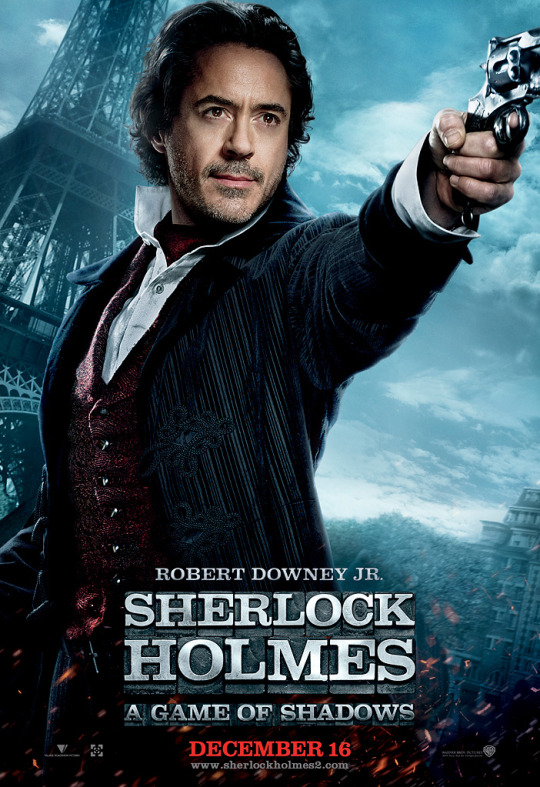
“I…Am…Iron Holmes! DADA-DADA-DADA-DA-DADA-DA!”
Sorry. Couldn’t resist. XD
ANYWAY…to many people Robert Downey, Jr. will forever be known as perhaps the most definitive portrayal of the Marvel superhero Iron Man, but – even as he was tackling such enemies as the God of Mischief and…um…Jeff Bridges and Mickey Rourke, I guess - Downey Jr. was also cracking cases in a steampunk-inspired rough-and-tumble Victorian London. Directed by Guy Ritchie, Downey Jr.’s Holmes films seem to be slightly polarizing. MOST people seem to like them, but I know a few people that don’t: some dislike them for their more action-adventure orientation, some dislike them because of the choice of popular actors for the roles, some dislike them because of the way it fiddles with the “classic” Holmes style, and some dislike them because of the humor they feature.
Oh, yes. Because…(points to ALL THE HOLMES TAKES I’VE TALKED ABOUT BEFORE)…absolutely NONE of that has ever been attempted in the past. :P
Personally, not only do I like the Guy Ritchie films, I LOVE them. I’d actually say that the twin pictures make for either my second or third favorite take on the Holmes universe, as a whole, ever made. Having said that, you’re probably wondering now why he’s only at sixth place, if that is so. Well, I’ll get to that in a minute: first, let’s focus on the positives.
As I said before, both of these movies are more geared towards action-adventure than clue-sniffing crime-busting: in both cases, we know who the villains are, and it’s not long till we know what they want and why. The real mystery is figuring out how they plan to achieve their aims. Still, both films give Holmes plenty of time to use his whole arsenal of tricks: he fights plenty, sure, but he also uses his deductive reasoning to pick out details others would miss, and wears a variety of honestly often pretty good disguises. Holmes’ disguises in many versions are pretty transparent, but MOST of Sherlock Stark’s outfits are actually pretty convincing. (Most of them, lest we forget his drag outfit in “Game of Shadows.”) This is almost ironic, because Downey Jr. is one of the funniest takes on Holmes out there: half-insane, obsessive, quirky, and going to extreme lengths just to stave off boredom. He’s so reclusive he’ll lock himself away in total darkness for days at a time, and he’s always looking for something to occupy his mind. With his Bohemian sense of apparel and insufferably arrogant demeanor, he infuriates almost everybody around him – Watson, Mrs. Hudson, Inspector Lestrade, the list goes on – but you know that, at the end of the day, he’ll get the job done, and his heart is still in the right place.
Downey Jr. is helped immensely by his supporting cast: Jude Law is my favorite Watson, Jared Harris my favorite Moriarty, Paul Anderson my favorite Sebastian Moran, and various other characters are all among my favorite takes as well. Even some of the original characters featured, such as the main antagonist of the first movie, Lord Blackwood (played by Mark Strong in my favorite of his performances), are really fun and interesting figures. I love the style of these movies, I love Hans Zimmer’s musical score, I love their sense of humor and tension…so how come, again, this Holmes doesn’t at least make my Top 5? Well, to put it simply…as much as I adore Downey Jr. as Holmes, I’m always kind of aware of the actor behind the character. True, I suppose there are other characters who have a similar issue – I certainly can’t miss Matt Frewer, Tom Baker, John Barrymore, and several others I’ve mentioned in the past when I see them in the role – but with Downey Jr., the issue is a bit different.
It’s a bit like whenever I see, for example, David Tennant or Daniel Radcliffe in something: to me, David Tennant simply IS the 10th Doctor from “Doctor Who.” And Radcliffe simply IS Harry Potter. Anytime I see them in (almost) ANYTHING else, all I can see is the 10th Doctor or Harry Potter, and it’s incredibly distracting. It’s one thing to be distracted by the actor, but it’s a whole other issue to be distracted by an actor’s CHARACTER, if that makes sense. That’s the kind of relationship I have with Downey Jr. a lot of the time: I just so identify him as Iron Man now that it’s hard for me to get that out of my head, no matter HOW good his performance is. And it IS a great performance – heck, alongside Iron Man, Holmes is the next character I think of with the man, and he’s equally grand in both roles. But something about the performance he gives, mixed with that familiar face, just leads to me seeing Iron Man as Holmes, rather than seeing Sherlock Holmes or even RDJ as Sherlock Holmes. It’s just a weird quirk of my own mind, and it sadly does keep Downey Jr. out of the top five…but only just.
On that note, tomorrow we move into the Top 5! Who will be next? Check in and find out!
#robert downey jr#iron man#sherlock holmes#sherlock stark#tony holmes#iron holmes#i've got a million of 'em#well#no#more like...four#three of which are here#bleh#ele-may-ntary#top 31 sherlock holmes portrayals#number 6#guy ritchie#game of shadows#sherlock holmes 2009
11 notes
·
View notes
Text
Ele-May-ntary - Number 10
Welcome to Ele-May-ntary! All throughout the month of May, I’ve been counting down my Top 31 Favorite Portrayals of Sherlock Holmes, from movies, television, radio, and even video games! We’ve reached the Top 10 on the countdown!
Last time, I talked about Michael Caine’s portrayal from “Without a Clue.” Today, we’ll talk about another reimagining featuring a popular actor.
Number 10 is…Ian McKellen.
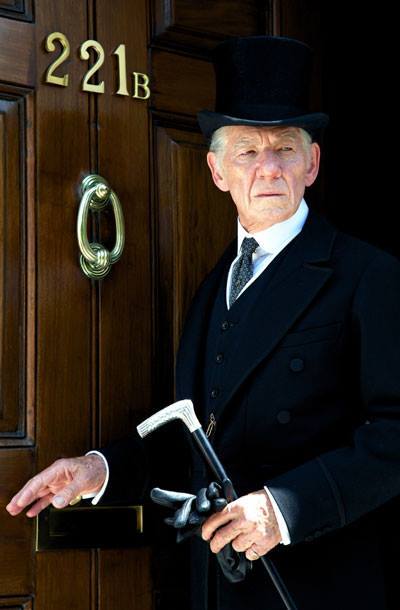
Yep. Gandalf the Grey, Magneto, Shakesperean legend, et al himself played Sherlock Holmes, and fairly recently, too. McKellen took on the role of the World’s Greatest Detective in the 2015 picture “Mr. Holmes.” That film was less of a typical Holmesian mystery, and more of a psychological drama, which – in itself – is already a rather unique direction to take things.
In “Mr. Holmes,” Sherlock is an aged fellow who has long since retired from detective work, now living peacefully and keeping bees in Sussex. He hasn’t seen Watson in years, and most of his associates are either dead or distant from him. Holmes’ mind is beginning to fail him in his elderly state, which is especially bad because he’s trying to recall something important: something is wrong with Watson’s account of his final case, but he’s not sure what really happened. He’s been trying to experiment with rare plants to resurrect his broken memory, but finds it naturally very difficult to do so in his increasingly infirm state. With help from the son of his personal housekeeper and nurse, he starts to put together the pieces of his past, realizing the truth of his final case, and also learning some important things about himself in the process.
Just as Nicholas Rowe gave us exactly what you would expect a teenaged Holmes would be like, I would argue that – of all the times we’ve seen Holmes as an older man either nearing or in a state of retirement – McKellen gives us the most likely and poignant take on such a concept. This isn’t so much a Sherlock Holmes story so much as it is a story ABOUT Sherlock Holmes, so to speak. The movie isn’t so concerned with catching a master criminal or stopping some devious crime as it is in dealing with some very complex and human emotions and issues. The story deals with themes of isolation, depression, mortality, parenthood, and other human frailties and concerns you don’t generally find touched upon so deeply in other Holmes stories.
Despite his age, Holmes remains the same prickly eccentric we all know and love, and his at times distant demeanor is a big part of the story: he’s become even more cut off from the world in his old age, and has to learn to open his heart as well as his mind. He’s still a keen observer and quick to deduce things easily, but he’s no longer the quick-witted adventurer we remember from earlier tales and interpretations. This is a Holmes who is vulnerable, sedentary, and decidedly unstable. I can’t think of much more to say about it: it’s one of McKellen’s finest performances, and a truly fascinating addition to the silver screen exploits of the world’s most famous super sleuth.
The countdown continues tomorrow! Who will be next? Check in and find out!
8 notes
·
View notes
Text
Ele-May-ntary - Honorable Mentions
Welcome to Ele-May-ntary! All throughout May, I’ll be counting down my Top 31 Favorite Portrayals of Sherlock Holmes, from films, television, and even a few video games.
Tomorrow, the countdown begins in earnest. But today, on the last day of April, we’ll be covering a few Honorable Mentions. These Ten Terrific Takes on the World’s Greatest Detective are decent, at least in my humble opinion, but ultimately didn’t make the cut.
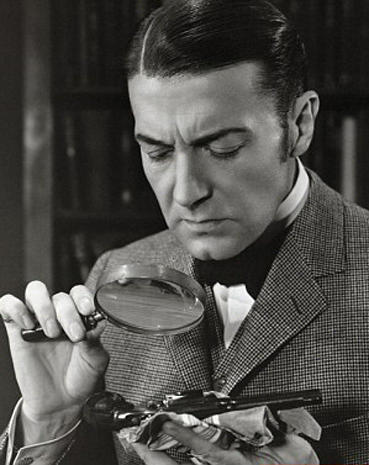
1. Clive Brook.
Brook is a very “old school” Sherlock Holmes: he appeared as Holmes in the very first sound film featuring the character, “The Return of Sherlock Holmes,” and then again a couple years later in the 1932 film simply titled “Sherlock Holmes,” which was adapted from the popular play of the same title. Brook isn’t bad, but – like a lot of older portrayers of the character, to be honest – his adaptations haven’t really stood the test of time. His performance, and the pictures themselves, overall, are severely dated; when we get to the main list, there will be some actors from the early days of Holmesian cinema who DO still hold pretty strong today, but Brook, in my opinion, is not among them. He has his shining moments, though, and as the first Holmes whose voice we ever got to hear, he definitely deserves some historical credit.
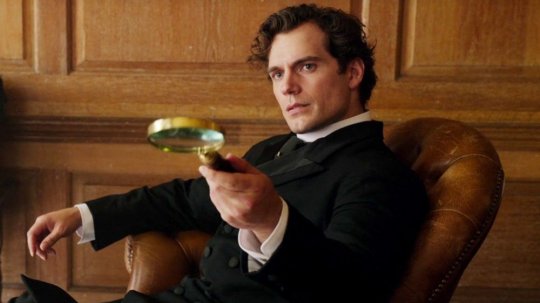
2. Henry Cavill.
I have mixed feelings about the movie “Enola Holmes.” On the one hand, I like the title character, the villains are well done, the plot is pretty good…generally speaking, it’s a very solidly put-together movie. On the other hand, I’m not as fond of the way the Holmes brothers are portrayed: Mycroft, traditionally stated to be smarter than “Sherly,” is instead sort of a pompous buffoon. As for Henry Cavill as Sherlock himself…I give Cavill credit, he’s not shoehorning anything, and his relationship with his siblings is a good one, but I just can’t watch him without seeing Superman in a Sherlock Holmes costume. Cavill plays a more vulnerable, gentle Holmes – almost to a fault, as this nearly led to a lawsuit, believe it or not – and I think it would have been much better if we’d gotten to see him really dig into a take on the character closer to what Doyle wrote. As it stands, he’s not bad, I suppose, but he definitely takes a back seat to his fictional sister in this tale, and that mixed with the actor’s perpetual recognizability ultimately leaves him off the countdown.
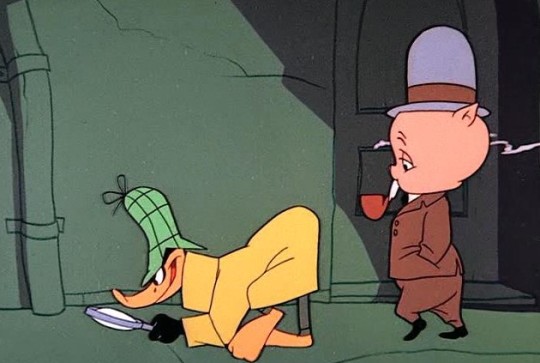
3. Daffy Duck, a.k.a. “Dorlock Homes.”
I decided it wouldn’t hurt to include a few Holmes parodies on this list, and this is one of the earliest and still best. It’s hard to go wrong with Looney Tunes. Daffy Duck as Sherlock Holmes is about as ridiculous as it sounds, and part of the humor comes from Porky Pig as his straight man in the form of the eternally unfazed, fully-aware-his-friend-is-a-loon Dr. Watkins. Not much else to say, it’s just as funny as you’d hope.
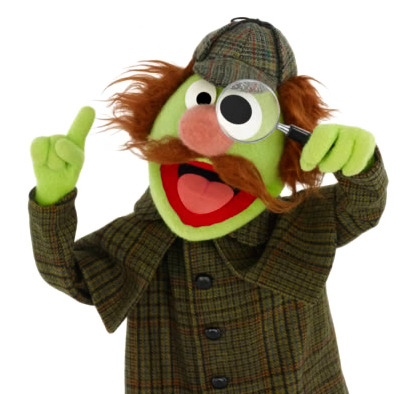
4. Sherlock Hemlock.
Another Holmes parody! Performed by the late Jerry Nelson, Sherlock Hemlock was a spoof of Sherlock Holmes who appeared on Sesame Street for many, many years. As you might guess, his whole schtick was that he was a “brilliant” sleuth who always got things wrong. The way things happened was interesting, however: Hemlock actually could pick out details and observations, but the problem was he NEVER came to the right conclusions with his inferences. He was a lot of fun, no matter what age you were, and I actually really loved seeing him whenever he would pop up. However – perhaps at least partially due to Nelson’s passing, or the character just not being especially popular – Hemlock has not been seen nearly as frequently since at least the early 2000s, outside of a few surprise appearances or minor cameos.
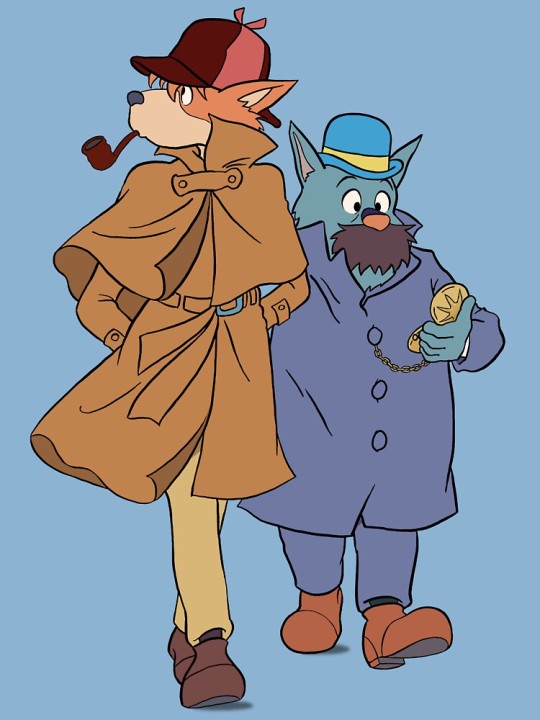
5. Sherlock Hound.
This made-for-children series was an early success of the famed animator Hayao Miyazaki, and I should immediately state that the animation is the main reason I think this series has gained its cult following. Considering both the time period and the budget, the aesthetic design and the fluidity of the animation are really top notch; it is what you would hope for in a Miyazaki effort, even if it’s at a fraction of the cost as some of his more lauded works, such as his films for Studio Ghibli. However, in terms of the portrayal of Holmes himself, and the stories…it’s pretty basic and clearly watered-down from the source material. Sherlock himself is depicted as altruistic, polite, romantic…effectively everything Holmes is not. It doesn’t help that I’ve sadly only seen the dubbed version, and the dubbing on this show is AWFUL: it’s frankly one of the worst dubs I’ve ever heard in my life. Still, I can understand why some may enjoy it, and it’s not the worst version I’ve ever seen…I just find this Holmes and this interpretation in general to be more interesting than a true favorite.
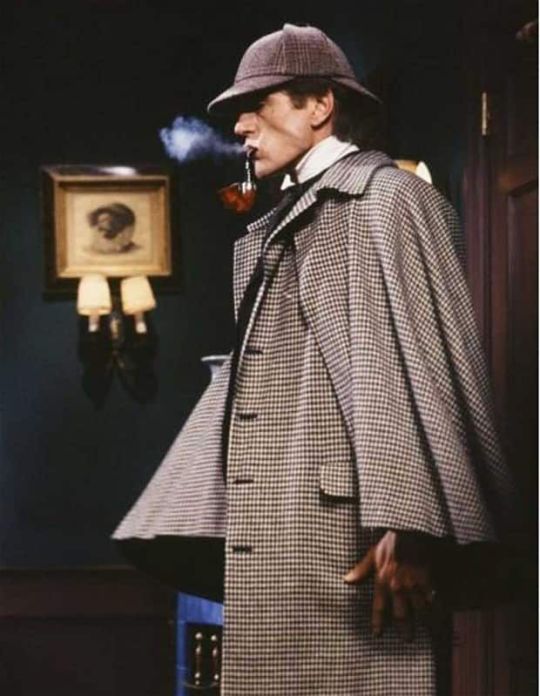
6. Jeremy Irons.
Oh, yes! Scar himself played Sherlock Holmes…kind of. In 1991, Irons appeared in an SNL skit entitled “Sherlock Holmes’ Surprise Party,” which was a loving parody of the Jeremy Brett series. In it, Watson, Inspector Lestrade, Irene Adler, Sir Reginald Musgrave, and Mrs. Hudson prepare a surprise birthday party for Holmes. (They apparently conspire with Professor Moriarty to make it happen, as Holmes’ arch-enemy evidently promised to keep him busy till the appointed time. I think the snicker-worthiness of that speaks for itself.) Unfortunately, the party is thoroughly ruined by Holmes’ powers of observation, as pretty much the moment he walks in he realizes where the guests are hiding, and then proceeds to guess what each of his gifts are before opening them. Watching this sketch, I have to say that Irons – at least in his younger days – really could have made a GREAT Holmes in a more serious work…but he certainly pulls it off here, too. If Irons alone isn’t enough to make you want to watch this sketch, it may be interesting to note that Mike Meyers, of all people, plays Inspector Lestrade, with Phil Hartman as Dr. Watson. I need not say more, I think.
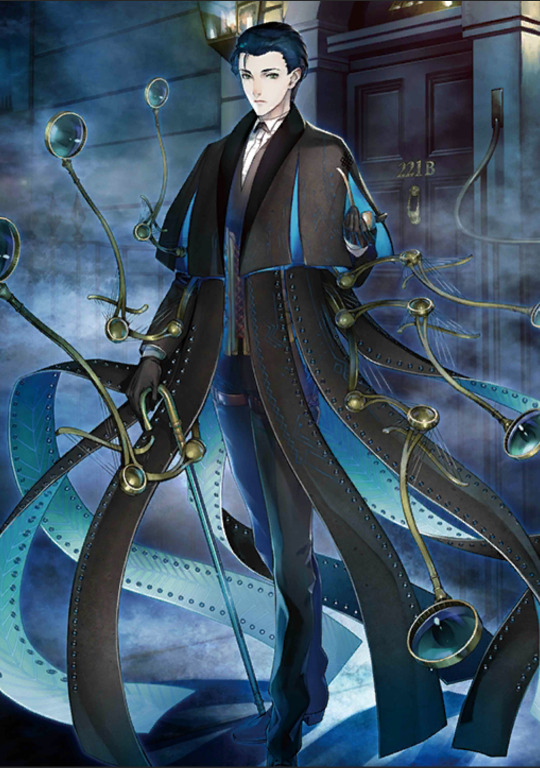
7. Takahiro Mizushima.
Japan strikes again! Mizushima is the voice actor for Holmes in the game “Fate/Grand Order,” part of the Fate franchise. In Fate, every sixty years, mages from around the world compete in what is called “The Holy Grail War” (which explains itself). For this war, they are able to summon Heroic Spirits who will aid them and do battle for them: these Spirits are all the greatest heroes AND villains of both history and literature. In “Grand Order,” Holmes is depicted as one of the Heroic Spirits. Fittingly, his arch-nemesis, Professor Moriarty, is also a Spirit that can be summoned. Not a bad portrayal (though I find some design elements a bit…odd), but since I haven’t played Grand Order, I didn’t think it was fair to include this Holmes on the list.

8. Roger Moore.
Roger Moore, of course, is most famous for playing James Bond, and before that, made a name for himself as the dashing Robin Hood of Modern Crime, The Saint. Moore was always a fan of crime stories, and in fact really loved the Conan Doyle classics. Naturally, he was enthusiastic when he got the role of Holmes in the film “Sherlock Holmes in New York.” However, the picture was not well-received, and most people – even to this day – remain unimpressed by Moore’s Holmes. Personally, I don’t think his work as Holmes is that bad, but the script and the rest of the cast around him don’t really do him many favors. Had he been in a better picture overall, he perhaps could have been a better take on the Master Detective.
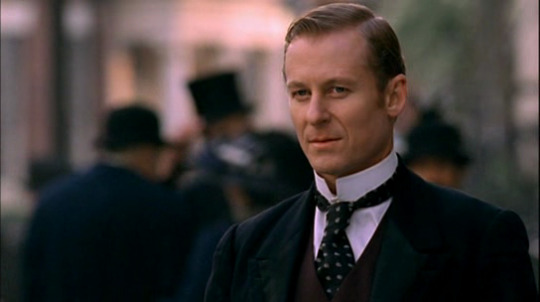
9. Richard Roxburgh.
I love Richard Roxburgh as an actor, and I feel a bit bad for not including him in the Top 31. Roxburgh played the character in a 2002 TV adaptation of “The Hound of the Baskervilles” – the most famous and my personal favorite Holmes story. The TV movie takes many significant liberties with the source material, and hyper-fixates, in my opinion, on Sherlock’s drug addiction for no clear reason at all. The overall product is not terrible, but it’s not brilliant, either; it’s just okay, and ultimately, Roxburgh’s performance in the role matches suit. He works well with what he’s got, but he’s ultimately not a portrayal I feel worthy of the Top 31. I do, however, have to give a great deal of credit to his Watson: Ian Hart, one of the more underappreciated takes on the good doctor, in my opinion. Hart played Watson again in the semi-sequel “The Silk Stocking.” That movie is decidedly less impressive than “Hound,” and Rupert Everett’s Holmes there really does just leave you wishing Roxburgh had come back.
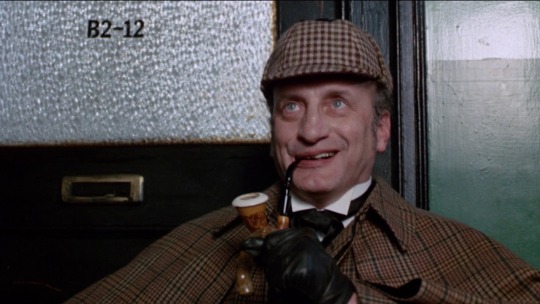
10. George C. Scott.
Ahhhh, George C. Scott…it almost hurt leaving this one off the list. Scott’s Holmes is interesting because he’s not TECHNICALLY Holmes. In fact, if you look up “actors who have played Sherlock Holmes” on Wikipedia, I don’t think he’s mentioned. Scott appeared in a film called “They Might Be Giants,” which actually features him as a man who suffers from delusions of being Sherlock Holmes. The movie is part psychological drama and part mystery/comedy blend. It’s a very interesting picture, and Scott plays his role brilliantly – definitely a favorite of his performances for me – but because the whole point of the film is that Scott’s character is NOT Holmes, but just someone who THINKS he’s Holmes, I didn’t think he counted for the main countdown.
Next time, the countdown truly begins! I won’t be leaving hints this time, like I did with my past two countdowns; you’ll just have to wait and see who starts us off. ;)
#ele-may-ntary#top 31 sherlock holmes portrayals#honorable mentions#they might be giants#george c scott#roger moore#sherlock holmes in new york#richard roxburgh#2002 hound#fate/grand order#jeremy irons#snl#sherlock hound#sherlock hemlock#daffy duck#deduce you say!#henry cavill#enola holmes#clive brook
11 notes
·
View notes
Text
Ele-May-ntary - Number 9
Welcome to Ele-May-ntary! All throughout the month of May, I’ve been counting down my Top 31 Favorite Portrayals of Sherlock Holmes, from movies, television, radio, and even video games!
Last time, we talked about Ian McKellen’s wizened take on the World’s Greatest Detective from “Mr. Holmes.” Today, we discuss a less crotchety take on the super sleuth.
Number 9 is…Jonny Lee Miller.
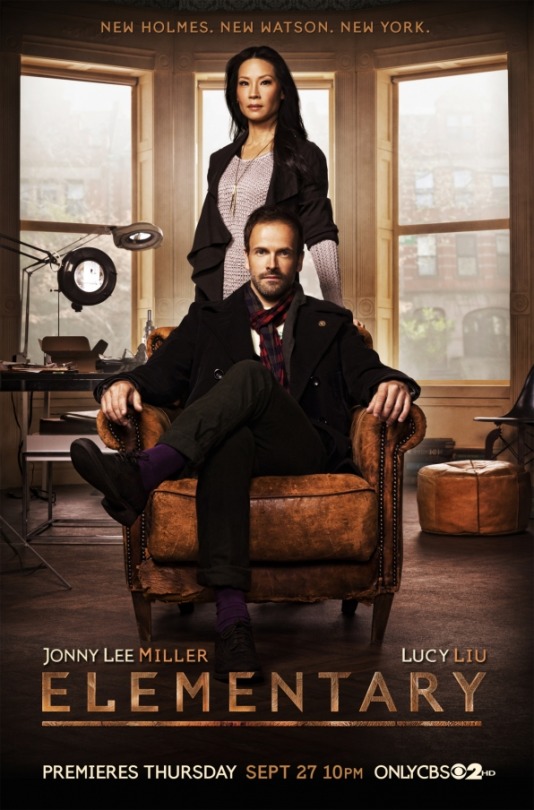
Miller played Holmes in the long-running crime drama series “Elementary.” This show became popular around the same time as BBC’s Sherlock, but despite lasting a long time, never seemed to become quite as renowned as that interpretation. I’m not sure why, since Elementary is a very interesting and well-conceived take on the Holmes canon.
In this series, much like Sherlock, the setting is the modern day…only instead of London, it takes place in New York. Sherlock Holmes is a recovering drug addict, whose “sobriety partner,” a female Dr. Watson, helps him solve particularly tough cases for the NYPD. Many of these cases and the criminals he catches are modernized reimaginings of stories and villains from the Conan Doyle canon. His chief nemesis is a female criminal mastermind, who is a combination of both Irene Adler AND Professor Moriarty, and the two have a close personal connection.
Some people deride this series because of its tone and style of writing, which really do feel like what you might call a “typical” modern crime drama. Whodunnit mysteries with a lot of banter and modern references, taking place in contemporary America. I actually don’t really see the problem with this: if anything, I’m personally glad someone took the initiative TO bring Sherlock Holmes into that kind of medium. It’s a more interesting medium than some people may anticipate, and by using the themes and characters from the Conan Doyle classics, you create not only a really fun crime series, but a fascinating reinterpretation of the Sherlock Holmes franchise.
Miller’s Holmes is a tragic, sardonic figure, in keeping with the style of this series. He has all the quirks and qualities we’d expect Holmes to have, and despite the modernization, something about his performance and aspects of his character – the way he moves, the way he dresses, and so on – gives him something of an “old soul.” I’ve always really liked characters of this sort: figures who are, as I like to put it, “out of place and out of time.” He doesn’t quite feel like he belongs amidst the ensemble, but that’s part of what makes him fascinating. He doesn’t smoke an old clay pipe, he doesn’t have the obvious physical attributes or decorations, but he FEELS almost like the Holmes of the gaslight era suddenly inserted into the modern day.
Interesting fun fact: did you know both Jonny Lee Miller and Benedict Cumberbatch starred side-by-side in a stage version of “Frankenstein”? They alternated between playing the Monster and the Doctor. Needless to say, I love that version: two Sherlocks for the price of one? Sold!
The countdown continues tomorrow! Who will be next? Check in and find out!
#ele-may-ntary#top 31 sherlock holmes portrayals#sherlock holmes#elementary#cbs#crime drama#jonny lee miller#number 9
7 notes
·
View notes
Text
Ele-May-ntary - Number 29
Welcome to Ele-May-ntary! All throughout the month, I’m counting down my Top 31 Favorite Portrayals of Sherlock Holmes, from movies, television, radio, and even a couple of video games!
Last time, I discussed Alfred Pennyworth – I mean, Alan Napier, and his one stint as Holmes in the 1949 version of “The Adventure of the Speckled Band.” That was a very obscure version, but today, we’ll be covering a somewhat more well-known portrayal.
Number 29 is…Ian Richardson.
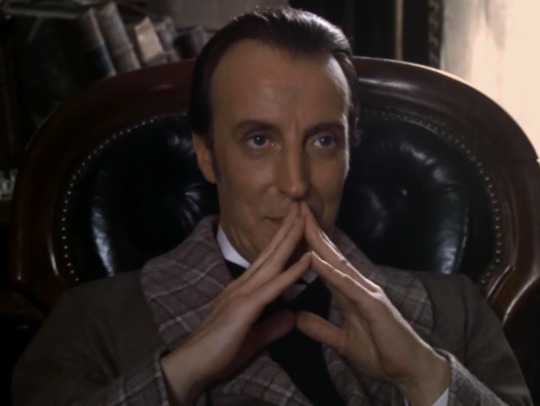
Richardson is what I would consider a cult classic Holmes. I say this because, when I see documentaries about different takes on Holmes as a character throughout the years, Richardson is an actor I don’t think I’ve ever seen mentioned. Despite this, the Shakepsearean-trained Richardson gives a portrayal that seems fairly popular among Conan Doyle fans. He first played Holmes in a television film adaptation of “The Hound of the Baskervilles,” which came out in November of 1983. The following month, a sequel came out, also based on a Conan Doyle Novel: “The Sign of Four.” There were plans to make more movies, but due to copyright issues, they were never produced. Later on, Richardson would play the real man who inspired Sherlock Holmes – Dr. Joseph Bell – in the crime series “Murder Rooms,” which told the story of how Sir Arthur Conan Doyle came up with his classic adventures.
The late Richardson is and was a fine actor; one of the greatest of his day, with a mellifluous voice and a commanding screen/stage presence. It should also be noted that he is one of the actors who most closely resembles the Holmes drawn by Sidney Paget in the original illustrations for the Conan Doyle classics. His casting was excellent, but for some reason, I’ve never been able to enjoy his Holmes the way so many other people do. Which is not to say he’s a bad Holmes, I should add: Richardson has a sort of ironic, disconnected sort of sensibility in his take on the Master Detective. He’s not as directly discourteous as other Holmes portrayals tend to be, it’s more that he never seems to realize his many oddities ARE oddities: he treats everything he does with a sort of casual flippancy, not seeming to understand why people find him strange. He takes nearly everything in his stride, and goes out of his way to try and save his enemies, even if they by no means deserve it. In a way, he’s one of the most outright heroic takes on Sherlock you can find, without straying too far from the necessary elements of the literary source.
Having said that…I’ve just never cared THAT much for Richardson in either of his Holmes outings. Honestly, I found him much, MUCH more interesting in “Murder Rooms,” perhaps because of the fact he’s not TECHNICALLY Sherlock Holmes there, and his take on Dr. Bell is indeed very strong. I think part of the problem with Richardson’s Holmes is a lack of a consistent, strong Watson: in the first film, Watson was played by Donald Churchill. In the second, he’s played by David Healy. Neither of them are bad actors, per say, but I just can’t stand their Watsons: they once again play the character of the good doctor in the vein of Nigel Bruce, but without the gravity or charm Bruce had. Richardson, in turn, feels like a kinder version of Rathbone, but without the proper chemistry required between himself and his partner(s). I don’t hate either movie – “Hound,” in particular, is mostly pretty good – but I’m just not in the crowd that adores Richardson’s Holmes all that much. But don’t be too disappointed: other highly popular Sherlocks will prove more successful on this list. Wait and see. ;)
The countdown continues tomorrow! Who will be next? Check in and find out!
#ele-may-ntary#top 31 sherlock holmes portrayals#ian richardson#1983 hound#sign of four#sherlock holmes#number 29
10 notes
·
View notes